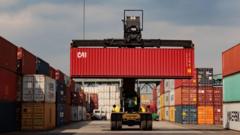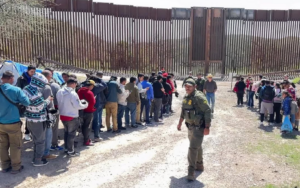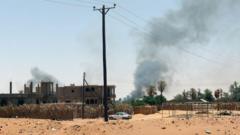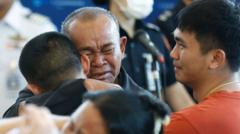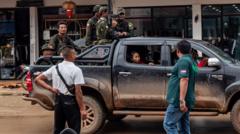"In a significant development, more than 250 foreign workers have been released from telecom fraud centers in Myanmar's Karen State, with many believed to be victims of human trafficking. The Thai government is taking action to dismantle these operations while facing scrutiny over ongoing abuses in the region."
"Rescue Efforts Bring Relief to Hundreds of Foreign Workers from Myanmar's Scam Operations"

"Rescue Efforts Bring Relief to Hundreds of Foreign Workers from Myanmar's Scam Operations"
"Over 250 individuals from various countries have been freed from fraudulent telecom centers in Myanmar, highlighting ongoing human trafficking concerns and international diplomatic efforts."
More than 250 foreign workers from 20 different nationalities have been successfully rescued from telecom scam centers located in Myanmar's Karen State. These individuals, primarily hailing from African and Asian countries, were released by the Democratic Karen Benevolent Army (DKBA), an ethnic armed group that has been accused of allowing such operations to thrive under their control. Following their release, the workers were escorted to Thailand, where they are undergoing evaluation to determine whether they were victims of human trafficking.
The Thai government, under Prime Minister Paetongtarn Shinawatra, recently engaged in discussions with Chinese leader Xi Jinping and pledged to take strong measures against the proliferation of scam centers along the Thai-Myanmar border. Such centers have been implicated in severe human rights abuses, including forced labor and violence against employees. To tackle the issue, Thailand has cut off access to power and fuel for these centers and has tightened banking and visa regulations to deter scammers from utilizing Thailand as a hub for their activities.
Foreign workers attracted to these centers are often promised high salaries or misled into believing they will be engaged in different types of employment. Many are subsequently coerced into participating in online scams that involve various fraudulent activities such as "pig butchering," crypto fraud, money laundering, and illegal gambling. Reports indicate that some workers have endured torture, and others remain trapped until substantial ransoms are paid by their families.
In an effort to combat these illegal operations, Thailand's Department of Special Investigation, which parallels the role of the FBI in the United States, has sought arrest warrants for three commanders associated with the Karen National Army, known for its previous dealings with Chinese investment in the region. Despite official claims, local accounts suggest that scam activities persist in newly constructed areas like Shwe Kokko.
Both DKBA and the Karen National Army have faced escalating pressure from Thailand and China to expel scam businesses from their territories. Following the recent handover of workers, the DKBAs leadership reached out to Thai officials to facilitate their release. Among the rescued, 221 men and 39 women were identified, coming from nations including Ethiopia, Kenya, the Philippines, Malaysia, Pakistan, and several other countries. This humanitarian endeavor underscores the complex realities of international trafficking networks and the ongoing crisis in Myanmar amid political instability and armed conflicts.



